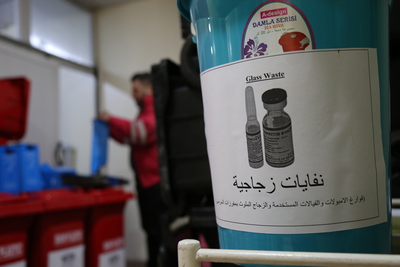Sanitary waste in northern and eastern Syria: improvement and extension of the system

Technical details
- Partners:
Un Ponte Per (UPP).
Kurdish Red Crescent (KRC).
Local authorities in northern and eastern Syria: the Jazira region Department of Local Administration and Environment (DoLAE), Jazira region Department of Health (DoH) and local councils and local committees for health (CoH) in Raqqa and Manbij.
- Action area:
- Near and Middle East . Syria
- Subject:
- Waste cycle
- Financing:
-
-
AMB: 157.458,67 €
-
- Status:
- In progress
Description
Against a backdrop of conflict, the local institutions in northern and eastern Syria are focusing their efforts on ensuring basic services to the local and displaced population in the region.
One of the main challenges to be addressed is improving waste management at the local and regional levels, and especially the development of safe and sustainable medical waste management. The destruction of infrastructure due to the armed conflict, coupled with the Covid-19 pandemic, has made support in this sector particularly necessary. The Kurdish Red Crescent, Un Ponte Per and the Barcelona Metropolitan Area have engaged in various strategies with local authorities to improve the management of medical waste in the region since 2019.
Within this framework, the intervention aims to consolidate, improve and extend the medical waste management system established in three muhafazahs (provinces): Al-Hasakah (in the Jazira region), Raqqa and Aleppo. It is essential to work with municipalities and supra-municipal governments to make this possible: the Department of Local Administration and Environment (DoLAE) and the Department of Health (DoH) in the Jazira region, and the committees for health (CoH) in Raqqa and Manbij.
The project is carried out in the following three areas:
- Strengthening the capacities of local authorities to ensure the separation, transport and treatment of medical waste. A two-pronged approach is being pursued to that end: on the one hand, the system is being extended to the west, more health centres are receiving support, and their procedures are being monitored; on the other, work is ongoing to enhance the capacities of local authorities and the coordination mechanism between them. A gradual handover of roles to the Jazira region, where the system was initially implemented, is also being arranged.
- Support for supra-municipal authorities (DoH and DoLAE) for the development and implementation of standard operating procedures (SOP) for the disposal of expired pharmaceuticals.
- Consolidation and improvement of the capacities of the MLRK’s Water, Sanitation and Hygiene Department to manage and oversee medical waste management and infection prevention and control measures.
The processes designed incorporate a rights-based approach, with a special focus on gender, diversity, sustainability and democratic governance, which are basic aspects to guarantee a transformative impact on the ground.
The holders of responsibilities are the local authorities in the municipalities and public institutions (DoH, DoLAE), as they are responsible for respecting, protecting and promoting environmental health in order to foster healthy and safe communities. The 1,491,661 inhabitants of Qamishli, Amuda, Derek, Hasaka, Tal Tamer, Darbasiyah, Raqqa and Manbij are the holders of rights, while civil society, in particular local NGOs, associations and the media, are the holders of responsibilities.
The intervention contributes to the 2030 Agenda, and in particular Sustainable Development Goals 3 (health and well-being), 5 (gender equality), 11 (sustainable cities and communities) and 15 (life in terrestrial ecosystems).













































